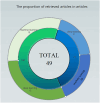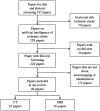A comprehensive review for artificial intelligence on neuroimaging in rehabilitation of ischemic stroke
- PMID: 38606275
- PMCID: PMC11007047
- DOI: 10.3389/fneur.2024.1367854
A comprehensive review for artificial intelligence on neuroimaging in rehabilitation of ischemic stroke
Abstract
Stroke is the second leading cause of death worldwide, with ischemic stroke accounting for a significant proportion of morbidity and mortality among stroke patients. Ischemic stroke often causes disability and cognitive impairment in patients, which seriously affects the quality of life of patients. Therefore, how to predict the recovery of patients can provide support for clinical intervention in advance and improve the enthusiasm of patients for rehabilitation treatment. With the popularization of imaging technology, the diagnosis and treatment of ischemic stroke patients are often accompanied by a large number of imaging data. Through machine learning and Deep Learning, information from imaging data can be used more effectively. In this review, we discuss recent advances in neuroimaging, machine learning, and Deep Learning in the rehabilitation of ischemic stroke.
Keywords: CT; MRI; artificial intelligence; ischemic stroke; rehabilitation.
Copyright © 2024 Zhao, Zhang, Su, Yang, Pang, Gao and Wang.
Conflict of interest statement
The authors declare that the research was conducted in the absence of any commercial or financial relationships that could be construed as a potential conflict of interest.
Figures





Similar articles
-
Emerging frontiers of artificial intelligence and machine learning in ischemic stroke: a comprehensive investigation of state-of-the-art methodologies, clinical applications, and unraveling challenges.EPMA J. 2023 Nov 2;14(4):645-661. doi: 10.1007/s13167-023-00343-3. eCollection 2023 Dec. EPMA J. 2023. PMID: 38094579 Free PMC article. Review.
-
An East Coast Perspective on Artificial Intelligence and Machine Learning: Part 2: Ischemic Stroke Imaging and Triage.Neuroimaging Clin N Am. 2020 Nov;30(4):467-478. doi: 10.1016/j.nic.2020.08.002. Neuroimaging Clin N Am. 2020. PMID: 33038997 Review.
-
Application of Machine Learning Techniques for Characterization of Ischemic Stroke with MRI Images: A Review.Diagnostics (Basel). 2022 Oct 19;12(10):2535. doi: 10.3390/diagnostics12102535. Diagnostics (Basel). 2022. PMID: 36292224 Free PMC article. Review.
-
Leveraging artificial intelligence in ischemic stroke imaging.J Neuroradiol. 2022 Jun;49(4):343-351. doi: 10.1016/j.neurad.2021.05.001. Epub 2021 May 11. J Neuroradiol. 2022. PMID: 33984377 Review.
-
Deep learning guided stroke management: a review of clinical applications.J Neurointerv Surg. 2018 Apr;10(4):358-362. doi: 10.1136/neurintsurg-2017-013355. Epub 2017 Sep 27. J Neurointerv Surg. 2018. PMID: 28954825 Review.
Cited by
-
A 25-Year Retrospective of the Use of AI for Diagnosing Acute Stroke: Systematic Review.J Med Internet Res. 2024 Sep 10;26:e59711. doi: 10.2196/59711. J Med Internet Res. 2024. PMID: 39255472 Free PMC article.
References
-
- Malhotra K, Katsanos AH, Goyal N, Ahmed N, Strbian D, Palaiodimou L, et al. . Safety and efficacy of dual antiplatelet pretreatment in patients with ischemic stroke treated with IV thrombolysis: a systematic review and meta-analysis. Neurology. (2020) 94:e657–66. doi: 10.1212/WNL.0000000000008961, PMID: - DOI - PubMed
Publication types
LinkOut - more resources
Full Text Sources

